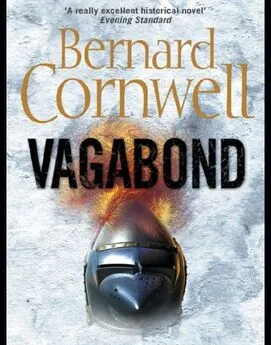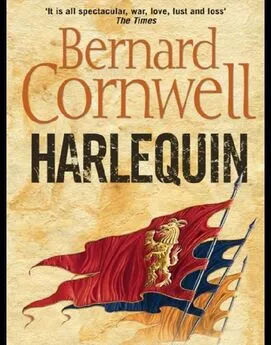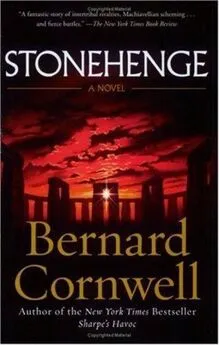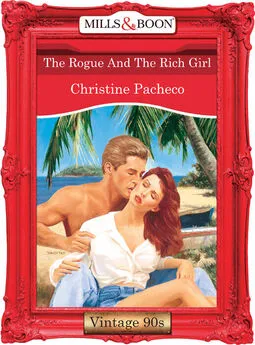Bernard Cornwell - The Grail Quest 2 - Vagabond
- Название:The Grail Quest 2 - Vagabond
- Автор:
- Жанр:
- Издательство:неизвестно
- Год:неизвестен
- ISBN:нет данных
- Рейтинг:
- Избранное:Добавить в избранное
-
Отзывы:
-
Ваша оценка:
Bernard Cornwell - The Grail Quest 2 - Vagabond краткое содержание
In Harlequin, Thomas of Hookton travelled to France as an archer and there discovered a shadowy destiny, which linked him to a family of heretical French lords who sought Christendom′s greatest relic.
Having survived the battle of Crécy, Thomas is sent back to England, charged with finding the Holy Grail. But Thomas is an archer and when a chance comes to fight against an army invading northern England he jumps at it. Plunged into the carnage of Neville′s Cross, he is oblivious to other enemies who want to destroy him. He discovers too late that he is not the only person pursuing the grail, and that his rivals will do anything to thwart him.
After hunting and wounding him, Thomas′s enemies turn him into a fugitive. Fleeing England, he travels to Normandy, determined to rescue Will Skeat, his old commander from Harlequin. Finally Thomas leads his enemies back to Brittany, where he goes to discover an old love and where his pursuers at last trap their reluctant pilgrim.
Vagabond is a vivid and realistic portrait of England at a time when the archer was king of Europe′s battlefields.
The Grail Quest 2 - Vagabond - читать онлайн бесплатно ознакомительный отрывок
Интервал:
Закладка:
'It's the same here,' Thomas assured him.
Father Pascal had proved a good companion. He had a fine singing voice and once they had shared their food with the verderer and his family the priest sang some French songs. Afterwards, as the snow still fell and the smoke from the fire swirled thick under the thatch, he sat and talked with Thomas. He had been the village priest at Evecque and, when the Count of Coutances attacked, he had found refuge in the manor. 'But I do not like being cooped up,' he said, and so he had offered to carry Sir Guillaume's message to England. He had escaped from Evecque, he said, by first throwing his clothes across the moat and then swimming after them. 'It was cold,' he said, 'I have never been so cold! I told myself it is better to be cold than to be in hell, but I don't know. It was terrible.'
'What does Sir Guillaume want us to do?' Thomas asked him.
'He did not say. Perhaps, if the besiegers can be discouraged . . . ?' He shrugged. 'The winter is not a good time for a siege, I think. Inside Evecque they are comfortable, they are warm, they have the harvest stored, and the besiegers? They are wet and cold. If you can make them more uncomfortable, who knows? Perhaps they will abandon the siege?'
'And you? What will you do?'
'I have no work left at Evecque,' the priest said. Sir Guillaume had been declared a traitor and his goods pronounced forfeited so his serfs had been taken off to the Count of Coutances's estates, while his tenants, pillaged and raped by the besiegers, had mostly fled. 'So perhaps I go to Paris? I cannot go to the Bishop of Caen.'
'Why not?'
'Because he has sent men to help the Count of Coutances.' Father Pascal shook his head in sad wonder-ment. 'The bishop was impoverished by the English in the summer,'
he explained, 'so he needs money, land and goods, and he hopes to get some from Evecque. Greed is a great provoker of war.'
'Yet you're on Sir Guillaume's side?'
Father Pascal shrugged. 'He is a good man. But now? Now I must look to Paris for preferment. Or may_ be Dijon. I have a cousin there.'
They struggled east for the next two days, riding across the dead heaths of the New Forest, which lay under a soft whiteness. At night the small lights of the forest villages glittered hard in the cold. Thomas feared if they would reach Normandy too late to help Sir Guillaume, but that doubt was not reason enough to abandon the effort and so they struggled on. Their last few miles to Southampton were through a melting slush of mud and snow, and Thomas wondered how they were to reach Normandy, which was an enemy province. He doubted that any shipping would go there from Southampton because any English boat going close to the Normandy coast was liable to be snapped up by pirates. He knew plenty of boats would be going to Brittany, but that was a long walk from Caen. 'We go through the islands, of course,' Father Pascal said. They spent one night in a tavern and next morning found space on the Ursula, a cog bound for Guernsey and carrying barrels of salt pork, kegs of nails, barrel staves, iron ingots, pots packed in sawdust, bolts of wool, sheaves of arrows and three crates of cattle horns. It was also carrying a dozen bowmen who were travel-ling to the garrison of the castle which guarded the anchorage at St Peter Port. Come a had west wind, the Ursula's captain told them, and dozens of ships carrying wine from Gascony to England could be blown up-channel and St Peter Port was one of their last harbours of refuge. though the French sailors knew it too and in bad weather their ships would swarm off the island trying to pick up a prize or two. 'Does that mean they'll be waiting for us?' Thomas asked. The Isle of Wight was slipping astern and the ship was plunging into a winter-grey sea.
'Not waiting for us, they won't be, not us. They know the Ursula, they do,' the captain, a toothless man with a face horribly scarred from the pox, grinned, 'they do know her and they do love her.' Which meant, presumably, that he had paid his dues to the men of Cherbourg and Carteret. However, he had paid no dues to Neptune or whatever spirit governed the winter sea for, though he claimed some special foreknowledge of winds and waves and asserted that both would be calm, the Ursula rolled like a bell swung on a beam: up and down, pitch-ing hard over so that the cargo slid in the hold with a noise like thunder; and the evening sky was grey as death and then sleet began to seethe on the torn water. The captain, clinging to the steering oar with a grin, said it was nothing but a little blow that should not worry any good Christian, but others in his crew either touched the crucifix nailed to the single mast or else bowed their heads to a small shrine on the afterdeck where a crude wooden image was wrapped in bright ribbons. The image was supposed to be St Ursula, the patron of ships, and Thomas said a prayer to her himself as he crouched in a small space under the foredeck, ostensibly sheltering there with the other passengers, but the overhead deck seams gaped and a mixture of rainwater and seawater continually slopped through. Three of the archers were sick and even Thomas, who had crossed the channel twice before and had been raised among fishermen and spent days aboard their small boats, was feeling ill. Robbie, who had never been to sea, looked cheerful and interested in every thing that was happening aboard.
'It's these round ships,' he yelled over the noise, 'they roll!'
'You know about ships, do you?' Thomas asked. 'It seems obvious,' Robbie said. Thomas tried to sleep. He wrapped himself in his damp cloak, curled up and lay as still as the pitching boat would let him and, astonishingly, he did fall asleep. He woke a dozen times that night and each time he wondered where he was and when he remembered he wondered whether the night would ever end or whether he would ever be warm again.
Dawn was sickly grey and the cold bit into Thomas's bones, but the crew was altogether more cheerful for the wind had dropped and the sea was merely sullen, the long foam-streaked waves rising and falling sluggishly about a wicked group of rocks that appeared to be home for a myriad seabirds. It was the only land in sight. The captain stumped across the deck to stand beside Thomas. 'The Casquets.' he said, nodding at the rocks. 'A lot of widows have been made on those old stones.' He made the sign of the cross, spat over the gunwales for luck and then looked up to a widening rift in the clouds. 'We're making good time,' he said, 'thanks be to God and to Ursula.' He looked askance at Thomas. 'So what takes you to the islands?'
Thomas thought of inventing some excuse, family perhaps, then thought the truth might elicit something more interesting. 'We want to go on to Normandy,' he said.
'They don't like Englishmen much in Normandy, not since our King paid them a visit last year.'
'I was there.'
'Then you'll know why they don't like us.'
Thomas knew the captain was right. The English had killed thousands in Caen, then burned farms, mills and villages in a great swathe east and north. It was a cruel way to wage war, but it could persuade the enemy to come out of his strongholds and give battle. Doubt-less that was why the Count of Coutances was laying Evecque's lands waste, in hope that Sir Guillaume would be enticed out of his stone walls to defend them. Except Sir Guillaume had only nine men and could not hope to face the Count in open battle.
'We've business in Caen,' Thomas admitted, 'if we can ever reach the place.'
The captain picked at a nostril, then flicked something into the sea. 'Look for the troy frairs,' he said. 'The what?'
'Troy Frairs,' he said again. 'It's a boat and that's her name. It's French. She ain't big, no larger than that little tub.' He pointed to a small fishing boat, her hull tarred black, from which two men cast weighted nets into the broken sea about the Casquets. 'A man called Ugh„ Peter runs the Troy Frairs. He might carry you to Caen, or maybe to Carteret or Cherbourg. Not that I told you that.'
'Of course not,' Thomas said. He supposed the captain meant that Ugly Peter commanded a boat called Les Trois Freres. He stared at the fishing boat and wondered what kind of life it was to drag sustenance from this hard sea. It was easier, no doubt, to smuggle wool into Normandy and wine back to the islands. All morning they ran southwards until at last they made landfall. A small island lay off to the east and a larger, Guernsey, to the west, and from both rose pillars of smoke from cooking fires that promised shelter and warm food, but though that promise fluttered in the sky, the wind backed and the tide turned and it took the rest of the day for the Ursula to beat down to the harbour where she anchored under the loom of the castle built on its rocky island. Thomas, Robbie and Father Pascal were rowed ashore and found respite from the cold wind in a tavern with a fire burning in a wide hearth beside which they ate fish stew and black bread washed down with a watery ale. They slept on strawfilled sacks that were home to lice. It was four days before Ugly Peter, whose real name was Pierre Savon, put into the harbour, and another two before he was ready to leave again with a cargo of wool on which no duty would be paid. He was happy to take passengers, though only at a price which left Robbie and Thomas feeling robbed. Father Pascal was carried free on the grounds that he was a Norman and a priest which meant, according to Pierre the Ugly, that God loved him twice over and so was unlikely to sink Les Trots Freres so long as Father Pascal was aboard.
God must have loved the priest for he sent a gentle west wind, clear skies and calm seas so that Les Trois Freres seemed to fly her way to the River Orne. They went up to Caen on the tide, arriving in the morning, and once they were ashore Father Pascal offered Thomas and Robbie a blessing, then hitched up his shabby robe and began walking east to Paris. Thomas and Robbie, carrying heavy bundles of mail, weapons, arrows and spare clothing, vent south through the city.
Caen looked no better than when Thomas had left it the previous year after it had been laid waste by English archers who, disregarding their King's orders to dis-continue their attack, had swarmed over the river and hacked to death hundreds of men and women inside the city. Robbie stared in awe at the destruction on Ile St Jean, the newest part of Caen, which had suffered most from the English sack. Few of the burned houses had been rebuilt and there were ribs, skulls and long bones showing in the rivers' mud at the falling tide's margin. The shops were half bare, though a few countryfolk were in town selling food from carts and Thomas bought dried fish, bread and rock-hard cheese. Some looked askance at his bowstave, but he assured them he was a Scotsman and thus an ally of France. 'They do have proper bows in Scotland, don't they?' he asked Robbie.
'Of course we do.'
'Then why didn't you use them at Durham?'
'We just don't have enough,' Robbie said, 'and besides, we'd rather kill you bastards up close. Make sure you're dead, see?' He stared open-mouthed at a girl carrying a pail of milk. 'I'm in love.'
'If it's got tits you fall in love,' Thomas said. 'Now come on.' He led Robbie to Sir Guillaume's town house, the place where he had met Eleanor, and though Sir Guillaume's crest of three hawks was still carved in stone above the door there was now a new banner flying over the house: a flag showing a hump-backed boar with great tusks.
'Whose flag is that?' Thomas had crossed the small square to talk with a cooper who was hammering an iron ring down the flanks of a new barrel.
'It's the Count of Coutances,' the cooper said, 'and the bastard's already raised our rents. And I don't care if you do serve him.' He straightened and frowned at the bowstave. 'Are you English?'
Читать дальшеИнтервал:
Закладка:





![Робин Хобб - Странствия Шута [Fool’s Quest]](/books/1086209/robin-hobb-stranstviya-shuta-fool-s-quest.webp)

